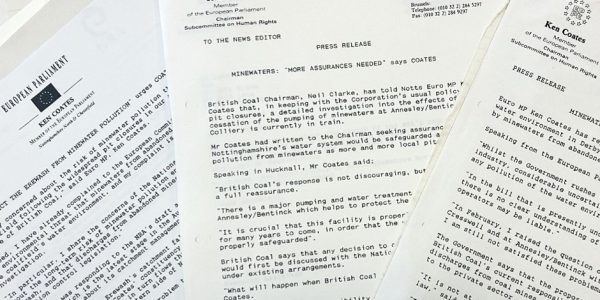Posts by Sarah Colborne
Environmental advocacy and European politics: The instrumental work of Ken Coates
December 9, 2025
This is a guest blog by Claire Crompton, a Geography undergraduate student undertaking a placement with Manuscripts and Special Collections, with a response from Tony Simpson, former assistant to Ken Coates MEP. Claire Crompton: During my placement with the Manuscripts and Special Collections team, I worked on the local environmental files of Ken Coates. Coates …
Researching historic documents of climate, weather, and health
October 28, 2025
This is a guest blog by Jamie Wright, a second year Archaeology student undertaking a paid placement with Manuscripts and Special Collections at the University of Nottingham in the summer of 2025. As a part of the Faculty of Arts, Summer Research Placement Project, I got to spend four weeks working in the Manuscripts and …
The Leen: Nottingham’s River
September 25, 2025
Ask anyone to name a river they associate with Nottingham, and they will likely say the Trent. Our latest exhibition at Lakeside Arts puts the lesser-known River Leen at the centre of the story and examines its role in shaping modern Nottingham. Co-curated by Dr David Beckingham and Dr Rachel Dishington of the School of …
From Clues to Context: Exploring Archives as an Archaeology Student
April 28, 2025
This is a guest blog by Yan Chin, a second year Archaeology undergraduate student who completed a placement with Manuscripts and Special Collections in 2025 working on the records of Florence Boot Hall of residence. How does it feel to work with archives, with their rich historical value? As an archaeology student, this question’s been …
Extra mirrors and sewing rooms: “the civilising effect of female company upon the male population” in mixed halls of residence
September 5, 2024
Student placement Alice Lilley writes about her work on the Derby Hall archive at Manuscripts and Special Collections and what struck her about how student life has changed since the 1960s. As a volunteer through the Arts Work Placement module, I worked on the Derby Hall Collection for Manuscripts and Special Collections. This was an …
Art and activism: Rosemary Wels
July 22, 2024
Visitors to the exhibition dear sisters: activists archives at Lakeside Arts can’t fail to have noticed the striking designs of the posters produced by the Nottingham Women’s Liberation Group. We speak to the woman behind these posters, flyers and magazine covers to find out more about her art and her activism and ask how she …
Page 3, pin-ups and double standards
July 10, 2024
Tina Pamplin of the Nottingham Feminist Archive Group, and Sarah Colborne, Archivist at the University of Nottingham, introduce a new addition to the East Midlands Feminist Archive: the ‘For Women Only’ calendar which was produced by Lincoln Women’s Action Group. They compare it to a similar occasion in the University’s history when printers refused to …
Time with Lawrence – a student from Malaysia campus on her archive placement
May 16, 2024
This is a guest post by Yunyu, a student from the University of Nottingham’s Malaysia campus who recently completed a volunteer placement at Manuscripts and Special Collections working on the uncatalogued papers of John Worthen, a world renowned D.H. Lawrence expert and former member of staff at UoN. Yunyu’s placement concentrated on Worthen’s work as …
Uncovering feminism and sexism in the University Archives
May 13, 2024
This is a guest post by Samantha Brinded, who volunteered with Manuscripts and Special Collections between May 2023 and March 2024. For decades, student magazines have played an integral role in university culture, and the University of Nottingham is no exception. In 1939, students established a newspaper called Gongster following on from the campus arts …
dear sisters exhibition opens
April 10, 2024
Manuscripts and Special Collections were delighted to welcome so many people to the launch of the exhibition dear sisters: activists’ archives at the Weston Gallery last month. The exhibition was officially opened by Professor Shearer West, the University of Nottingham’s first female Vice-Chancellor, and Vandna Gohil, CEO of Nottingham’s Women’s Centre. Both spoke of the importance …


